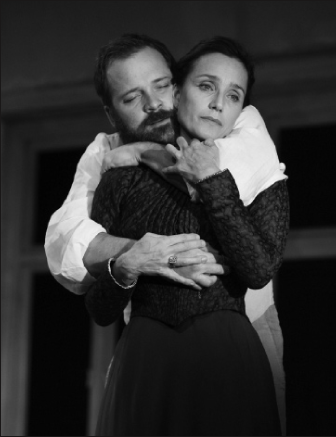By Anton Chekhov
Chekhov’s ‘Seagull’ marks the most anticipated revival of the fall season
THE SEAGULL
Directed by Ian Rickson
Limited Run Through December 21
Walter Kerr Theatre
219 West 48th Street
212-239-6200, SeagullThePlay.com
By Scott Harrah
Chekhov are a proverbial acquired taste, and this uneven revival of “The Seagull” from Britain’s Royal Court Theatre is no exception. Written in 1895, “The Seagull” is typical Chekhov with its existentialist dialogue and plot revolving around the emotional turmoil and romantic and financial problems of a group of actors, artists and writers spending the summer on a country estate outside Moscow.
From the very first scene, in which the character Masha (Zoe Kazan) admits she’s dressed in black because she’s in mourning for her miserable life, it’s evident that one is in for an evening of drama featuring people overwrought with frustration and self-loathing. Chekhov, like so many Russian writers of the late 19th and early 20th century, was never known for lighthearted fare.
There is some exquisite acting here, most notably from Oscar nominee Kristin Scott Thomas portraying the elegant Russian actress Arkadina. In her stylish costumes, speaking in her mellifluous British accent and displaying a wide range of emotions, Thomas is always first rate. Peter Sarsgaard as her young lover, writer Trigorin, is equally effective. Thomas as Arkadina is haughty in all the right places, icy toward the guests on the estate owned by her brother Sorin (Peter Wight) while trying to win them over as the play progresses.
One major problem with this British import — a recent hit in London — is the mixture of British and American actors. The cast of “The Seagull” features numerous American actors attempting accents, but some fail miserably. Case in point: up-and-coming American actor Zoe Kazan as Masha. Throughout the entire show, Kazan speaks in an odd hybrid dialect of British, Russian and American that is totally unconvincing and distracts from her performance. The play is set in Russia, but nearly none of cast affects Russian accents, so Kazan might have been more believable if she’d simply delivered dialogue without attempting a phony-sounding accent.
Another plausibility issue is the casting of Mackenzie Crook as Konstantin, Arkadina’s troubled writer son. Arkadina is supposed to be age 43, but Crook — although he gives a touching performance — seems a bit too old-looking to be her son.
Carey Mulligan as the fair-haired Nina, the actress who performs one of Konstantin’s unpublished plays at the estate and is ridiculed by Arkadina, is far more on-target with her elegant mannerisms and top-notch performance. As Konstantin unsuccessfully tries to win his mother’s unrequited love, he seeks solace in Nina.
Christopher Hampton worked on the script for this production of “The Seagull” and attempted to make the translation truer to Chekhov’s original manuscript, with dialogue that was crisper and terse. This subtle tweaking will probably only be noticed by Chekhov scholars because most of the dialogue appears as long-winded and florid as in previously translated productions. Still, “The Seagull” runs the gamut of emotions, from joy, philosophizing about the meaning of life, and the despair of creative people in Czarist Russia.
Hildegard Bechtler’s period costumes and sparse scenic design — birch trees, austere-looking facades — bring late 1800s Russia to glorious life. Despite primarily superb acting from most of the ensemble, some questionable casting choices undermine part of the story’s dramatic foundations. Regardless of its flaws, however, this is a “Seagull” revival that will still please Chekhov enthusiasts.


































